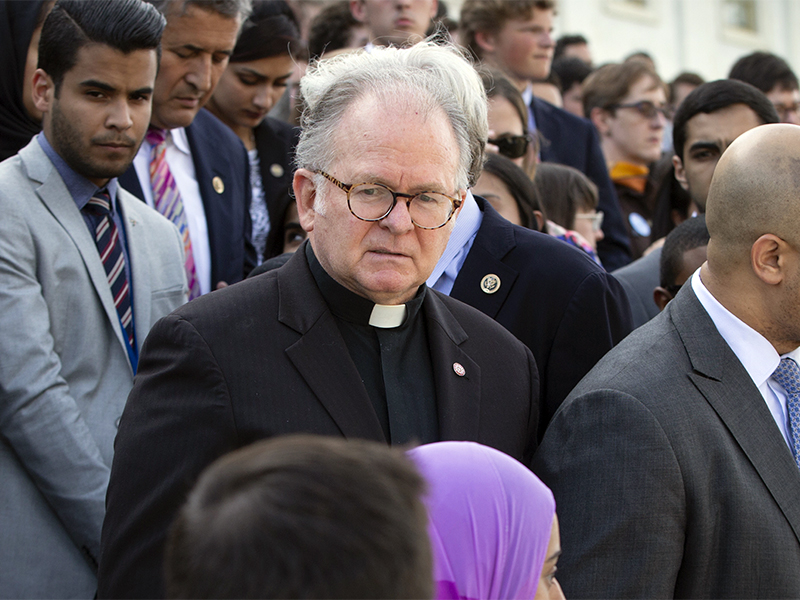Sign up to get Sightings in your inbox. You can also follow us on Facebook or Twitter.
Yawn, if you will. A chaplain, usually seen as a quiet fixture in the house—in this case, the House, whose occupants legislate in Washington—was mentioned in headlines last week. Easily overlooked in his clerical gear, he usually stays out of the news by quietly performing his duties. But now, suddenly, citizens began to read headings such as “Firing/rehiring of House chaplain about far more than 1 person’s job” or “House chaplain retracts resignation, and Speaker Ryan lets him remain in post” or “Ryan Reinstates House Chaplain After Priest Decided to Fight Dismissal,” all of which shouted for attention.
Question: what action or blast by U.S. House Chaplain the Rev. Patrick Conroy, S.J., could have caused such a stir?
Answer: he prayed. Praying is what chaplains, especially House and Senate chaplains, do. Did he utter blasphemies or heresies? Hardly. Conroy had prayed that lawmakers would “guarantee that there are not winners and losers under new tax laws, but benefits balanced and shared by all Americans.” Oh-oh! Speaker Paul Ryan, also a Catholic, muscled in, according to Conroy, saying: “Padre, you just got to stay out of politics.” Then he fired the chaplain.
Let’s play the game, and go along. Yes, padre was in politics, embodied that day in the House and being exercised continually by conscientious legislators, those who voted for them, and those who are affected by their actions. In a republic, such as ours, being “in” politics is inescapable. It is often said that when something is up for decision, as something always is, “not to take a stand is to take a stand.” Jehovah’s Witnesses may think that they are, if not above, then at least apart from, the frays of politics, but they are as busy as voters and other citizens in civil society.
What was at issue with the Speaker and, no doubt, with millions who would side with him that day, was not the chaplain’s being in politics, but rather, his seeming to take a stand that would alienate many. Was the chaplain betraying his calling? He could cite chapter and verse in the Bible, in Catholic social theology, and in the Jesuit tradition for backing. He could also try to show how pursuing the assurance that “benefits” of tax plans would be “balanced and shared” by all citizens was in place. How to assure that is, of course, a complex matter, but his prayer was not laying out a legislative program. That is something legislators on all sides have to deal with.
After a conflict like last week’s, thoughtful citizens look for a better way. Some say “abolish the chaplaincy,” and all will be balanced and shared. Or: “remove religious discourse and contention from the political scene.” Or: “remove religion.” The founders did well by not proposing a neat solution for how to deal with religion or religions, but establishing where religious institutions are subordinated to the political in political doings. Subordinated, yes, though they are “ordinated”—they have their ever-shifting places in our inescapable political order.
Somehow the padre and his fellow Catholic, Speaker Ryan, eventually came to terms such that the delicate discourses and contentions in that political order can continue to make their respective contributions to the common good, potentially even in “shared” and “balanced” ways.





